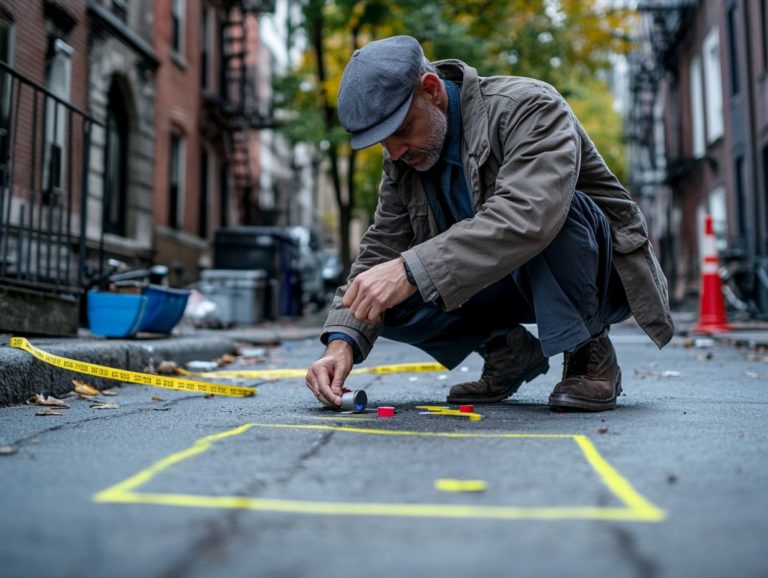How to Handle Discovery in a Criminal Case?
Discovery in a criminal case is a pivotal step that can profoundly influence the trial’s outcome.
Grasping what discovery entails and its significance is essential for anyone navigating the complexities of the legal system.
There are various types involved, including written and oral discovery, as well as methods of obtaining evidence from the prosecution. This guide demystifies the process while highlighting common challenges you may encounter.
By mastering how to analyze and utilize discovery materials effectively, you can prepare your defense with confidence and significantly enhance your chances of achieving a favorable outcome.
Delve into this guide to equip yourself with the knowledge you need about the discovery process in criminal cases.
Contents
- Key Takeaways:
- Understanding the Discovery Process in a Criminal Case
- Types of Discovery
- Obtaining Discovery from the Prosecution
- Challenges and Limitations of Discovery
- Using Discovery in Your Defense
- Frequently Asked Questions
- What is discovery in a criminal case?
- When does discovery take place in a criminal case?
- What are the different methods of discovery in a criminal case?
- How should I handle discovery materials in a criminal case?
- What are my rights regarding discovery in a criminal case?
- What should I do if I believe the prosecution is withholding evidence during discovery?
Key Takeaways:

- Understanding the discovery process is crucial in a criminal case as it helps gather evidence and build a strong defense strategy.
- Various methods exist for obtaining discovery from the prosecution, including written and oral requests.
- Overcoming challenges in the discovery process is essential for a successful defense.
- Analyzing and utilizing discovery materials effectively can greatly benefit your case.
Understanding the Discovery Process in a Criminal Case
Understanding the discovery process is essential for you, whether you’re part of the prosecution or the defense. It fundamentally shapes the fairness of the trial for the defendant.
In California, this process involves a formal exchange of evidence between the parties. This includes police records, witness statements, and any evidence that can help prove someone innocent. Such information is critical for effective legal representation.
This process upholds the integrity of the judicial system while allowing both sides to prepare for trial with confidence and knowledge.
What is Discovery and Why is it Important?
Discovery is the legal process where you, whether in the role of prosecution or defense, gather and exchange essential information and evidence that will come into play during a trial. This step is vital for your defense strategy!
Throughout discovery, various types of evidence emerge. This includes police statements that offer firsthand accounts of incidents and forensic evidence that can unveil critical details about the crime scene.
Expert witness reports can illuminate the technical aspects of a case, helping the jury navigate complex information. If you fail to meet discovery obligations, you could face serious repercussions, such as sanctions or the exclusion of vital evidence, jeopardizing the trial’s fairness.
Ultimately, this process promotes transparency. It ensures that justice is served by allowing both sides to prepare adequately and present their cases with confidence.
Types of Discovery
In criminal cases, you encounter two primary types of discovery: written discovery and oral discovery. Each plays a vital role in the legal process.
Written discovery includes documents such as police reports, forensic evidence, and witness statements.
Conversely, oral discovery involves depositions and interrogatories, providing attorneys with the opportunity to gather information directly from witnesses or involved parties.
Together, these elements create a comprehensive picture essential for effective legal representation.
Take the next steps in your case preparation today to ensure you are ready!
Written Discovery

In criminal cases, written discovery encompasses a range of documents that both the prosecution and defense must disclose to one another. This includes police records, forensic reports, and expert witness statements. These documents are essential for constructing a robust case.
This discovery process enables you, as an attorney, to analyze the evidence thoroughly. It allows you to craft effective trial strategies based on the materials provided.
Beyond these foundational documents, written discovery may also involve witness statements, supporting evidence, and any pertinent communications that could influence the approaches of both the prosecution and defense. Each of these elements is crucial for ensuring a well-rounded understanding of the case. They ultimately enhance legal representation and trial preparation.
However, acquiring these vital materials can prove daunting. You may encounter judicial review, especially when one party suspects the other of withholding critical information.
You must navigate these legal complexities with a thorough understanding of court procedures and potential rulings. This highlights the intricate nature of evidence gathering in criminal proceedings.
Oral Discovery
Oral discovery is your gateway to gathering essential information through formal interviews under oath and written questions, allowing you to question witnesses and obtain critical testimony that could significantly sway the trial’s outcome.
This process is crucial for both sides to uncover the truth. It enables both the prosecution and defense to evaluate the credibility and reliability of witness statements key elements for crafting effective case strategies.
During depositions, you have the chance to conduct thorough interviews under oath. This can potentially uncover inconsistencies in a witness’s narrative that could become pivotal during cross-examination at trial.
Interrogatories are written questions you send to the opposing party. They further enhance this process by offering a clearer understanding of the facts and legal positions at play.
Consider a scenario where a key witness’s reliability is challenged during oral discovery. This could prompt a reevaluation of how each side positions itself in court. In criminal cases, where witness credibility often influences jury decisions, this is particularly impactful.
The insights you gather from these processes shape your trial strategies and play a vital role in plea negotiations. Both parties assess their likelihood of success based on the strength of the evidence and witness testimonies at hand.
Obtaining Discovery from the Prosecution
Navigating the process of obtaining discovery from the prosecution is a vital step for you as a defense attorney. It ensures that the trial is both fair and balanced.
This means formally requesting access to evidence, police records, and any other relevant information that could be essential in crafting a robust defense against criminal charges.
Methods for Requesting Discovery
Defense attorneys have several avenues to request discovery, including formal motions, subpoenas, and direct communication with the prosecution. All these methods ensure compliance with legal obligations, which are vital for acquiring evidence that could significantly influence the trial’s outcome.
To kick off the process, attorneys typically draft motions that clearly specify the evidence they are seeking. This underscores its relevance to the case at hand. For instance, a motion might aim to gain access to witness statements or police reports that have yet to be disclosed.
It s crucial for your legal team to stay vigilant regarding deadlines and procedural requirements. This helps avoid potential pitfalls that could jeopardize your defense. Challenges such as opposing objections or limited cooperation from the other party can complicate matters. Therefore, it is essential for defense counsel to adopt a strategic and persistent approach.
Challenges and Limitations of Discovery

Despite its critical importance, the discovery process in criminal cases presents a myriad of challenges and limitations. These obstacles can impede effective case preparation for both the prosecution and the defense.
You may encounter issues like non-compliance, incomplete disclosures, or even prosecutorial misconduct. All of these can create significant hurdles.
Navigating these obstacles demands a strategic approach. This is particularly important for defense attorneys who must adeptly maneuver through the complexities of the system.
Are you prepared to tackle the challenges of discovery?
Common Obstacles and How to Overcome Them
Common obstacles in the discovery process often include delays in obtaining evidence and incomplete disclosures from the prosecution. Challenges associated with law enforcement s documentation of police records can also hinder your ability to build an effective case.
Navigating these complexities requires a multifaceted approach. You can proactively address these challenges by implementing strong communication strategies with prosecutors and ensuring that all documentation is meticulously organized.
Continuously prompting for updates on any pending evidence is also vital. When faced with uncooperative parties, legal remedies like filing motions to compel discovery can prove essential.
Keep thorough records of all correspondences and documentation received. This practice is critical for establishing a clear case timeline and demonstrating any undue delays or failures in the discovery process.
Safeguarding the defendant s rights lays a stronger foundation for a successful defense.
Using Discovery in Your Defense
Utilizing discovery effectively is crucial for crafting a robust defense strategy in criminal cases. It enables you to analyze evidence, witness statements, and police records meticulously.
Pinpointing weaknesses in the prosecution’s case and leveraging evidence that proves your innocence allows you to develop compelling arguments. These arguments may ultimately lead to favorable outcomes for your clients.
Strategies for Analyzing and Utilizing Discovery Materials
Your strategies for analyzing and utilizing discovery materials should involve a systematic approach. This includes reviewing witness statements, forensic evidence, and police records.
A meticulous review helps you uncover inconsistencies and strengthen your defense. This analytical process is essential for crafting a defense strategy that can withstand trial scrutiny.
Consider employing specific analytical tools, such as software for timeline analysis. This technology can visually clarify events and highlight discrepancies in the prosecution s narrative.
Charting timelines can reveal where eyewitness testimonies fall short or conflict with physical evidence, such as surveillance footage or phone records. By doing this, you can significantly undermine the prosecution s arguments.
For example, charting the timeline of the crime scene alongside the availability of the accused can reveal reasonable doubt. This is especially true if alibi witnesses are backed by solid evidence.
Additionally, forensic analysis of materials, including DNA or fingerprints, can offer compelling defense arguments that challenge the credibility of incriminating evidence.
Watch this insightful video to learn more about handling discovery effectively!
Frequently Asked Questions

What is discovery in a criminal case?
Discovery in a criminal case is the process of exchanging information and evidence between the prosecution and the defense. This includes all evidence, witness statements, and other relevant materials.
When does discovery take place in a criminal case?
Discovery typically occurs after a defendant has been charged with a crime and the case has been brought to court. It can also happen during pre-trial proceedings or even during a trial.
What are the different methods of discovery in a criminal case?
The most common methods of discovery include police reports, witness statements, physical evidence, expert reports, and statements made by the defendant.
How should I handle discovery materials in a criminal case?
Carefully reviewing and analyzing all discovery materials is vital to building a strong defense. These materials can provide valuable information and help identify weaknesses in the prosecution’s case.
What are my rights regarding discovery in a criminal case?
As a defendant, you have the right to receive all relevant discovery materials from the prosecution. This includes any evidence or witness statements that may be used against you in court.
What should I do if I believe the prosecution is withholding evidence during discovery?
If you suspect the prosecution is withholding evidence, bring this issue to your attorney’s attention. They can then file a motion with the court to compel the prosecution to release the evidence.






